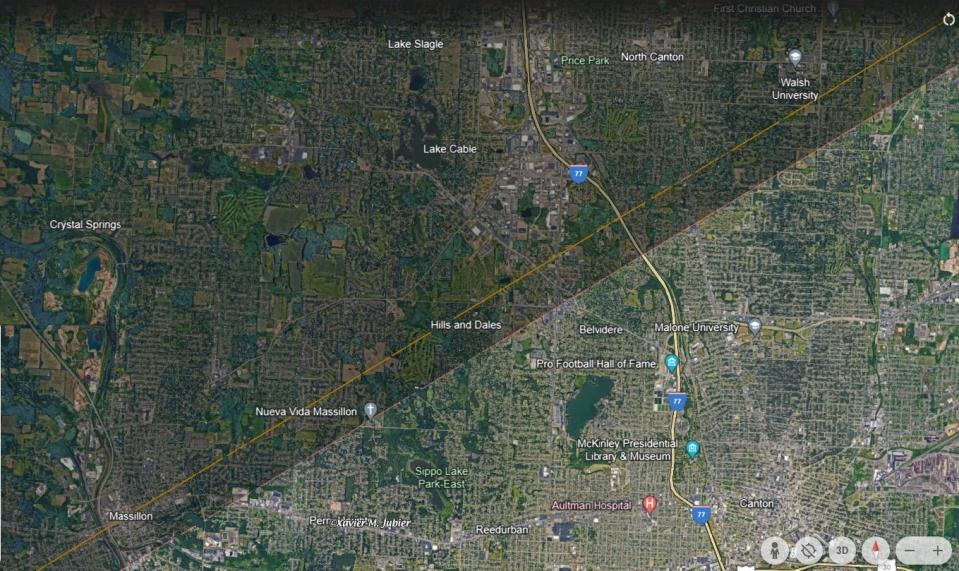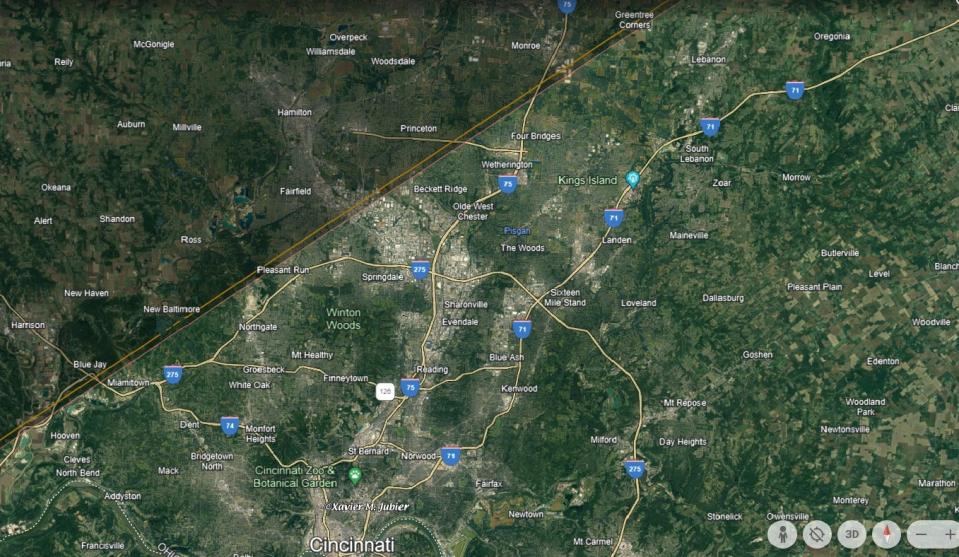2024 solar eclipse: 'New' path of totality map reveals Ohio could see less of the solar eclipse
[This story has been edited to include NASA's unchanged prediction for Ohio's path of totality for the 2024 eclipse.]
A total solar eclipse will cross North American skies on April 8, and Ohio residents will have a once-in-a-lifetime opportunity to view it.
But now, fewer Ohioans will experience 100% darkness during the 2024 solar eclipse.
That's because, despite modern technology, the sun's radius is difficult to measure. New data shows that the sun is a tad bigger than previously thought. These new calculations have slightly shifted the solar eclipse's path of totality — just a week before the event.
Expert John Irwin has recently published a new map with updated lines for the April 8 solar eclipse, Forbes reports.
Solar eclipse map: Updated path of totality in Ohio
The red lines shown below represent the original path of totality, while the orange lines show the path updated with the new data -- which predicts a narrower path of totality for Ohio.
Zoom in on Ohio to see if you'll be inside the path of totality during the eclipse on April 8.
Akron, Cleveland, Dayton, Toledo, other Ohio cities remain the path of totality
The new projections for the path of totality won't change the eclipse experience much for viewers close to the other big cities.
Akron, Cleveland, Dayton and Toledo will enjoy the full eclipse experience. So too will Ashland, Bucyrus, Mansfield, Marion and Sandusky.
Downtown Canton is also further away from the full eclipse experience
Downtown Canton was never projected to be inside the path of totality, but the new data projects complete darkness to fall further away from the city. However, North Canton remains inside the zone set to experience 100% darkness.
Massillon sat comfortably inside the path of totality, but the new projections show the eclipse's shadow falling north of downtown.

The path of totality will fall over Dublin, just a few miles north of Columbus
Ohio will get a slightly narrower path of totality by nearly a half mile on each side of the path, according to the new data. That shifts the fullest effects of the eclipse away from two of the state's largest cities.
Columbus remains outside the path of totality, but a few suburbs north of the city land on the path to experience complete darkness. Dublin still falls inside the path of totality, but nearby areas won't experience 100% darkness.
Riverlea now falls outside the path of totality, as does downtown Westerville, though the Otterbein University campus will straddle the path of totality.
On I-270, the exit at Cemetery Road was once inside the path of totality, but now sits just outside of it, based on the new data.
The eclipse will shift slightly further away from Cincinnati
The new path of totality moves the fullest eclipse experience away from downtown Cincinnati, just as it does for Columbus.
In Liberty Township, for example, St. Maximilian Kolbe Parish sat inside the path of totality while nearby Center Pointe Christian Church was on the other side. Now, both fall outside the path of totality.

What NASA says about the 'new' eclipse path of totality map
The sun's morphing size and changes in the moon's surface mean no two eclipses are the same, but NASA's projections for the 2024 eclipse aren't changing.
In speaking with the Detroit Free Press (which, like this publication, is owned by Gannett), NASA spokesman Tiernan Doyle acknowledged that even though the space agency is sticking with its original eclipse outlook in 2024, it aims to refine its eclipse predictions in the future by potentially taking into account the "topography of both the moon and the Earth."
Doyle added that there may be "a tiny but real uncertainty about the size of the sun," which could "yield an eclipse path that is slightly narrower."
And, he said, "uncertainty in the Earth’s rotation can also affect eclipse predictions on this level. Traveling toward the center of the path of totality — even a mile or two — will quickly increase the length of totality that people can see."
Whether or not the new path of totality is the correct one or the original prediction holds true, the overall difference would be minimal. As Doyle told the Free Press, "[It] would only affect cities on the very edge of the path of totality, where blanket predictions are difficult regardless ― a few city blocks one way or the other could mean 20, 10, or zero seconds of totality."
Austin American-Statesman reporter Alexis Simmerman and Detroit Free Press reporter Frank Witsil contributed to this report
This article originally appeared on Cincinnati Enquirer: Solar eclipse 2024: New data changes path of totality in Ohio; NASA outlook the same

